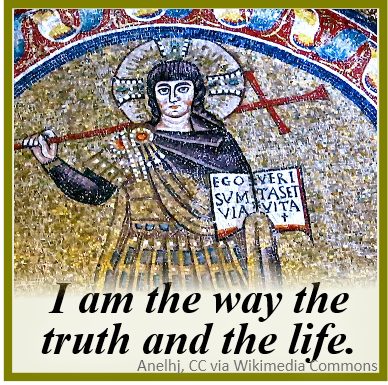Readings: Acts 6:1-7; 1 Peter 2:4-9; John 14:1-12
Theme: Following and witnessing to the Way of Jesus
The context of today’s gospel reading is Jesus’ lengthy conversation with his disciples at the Last Supper. While fully aware of his enemies’ determination to destroy him, Jesus’ concern is not for himself but for them. Sensing their sadness and apprehension, he prepares them for his imminent departure with words of comfort and encouragement. He urges them to trust in God and also in him, assuring them that ‘there are many rooms in my Father’s house’; that he is going ‘to prepare a place’ for them, and that he will return to take them with him (cf. Jn 1-3).
We tend to interpret these words of Jesus, frequently read during funeral liturgies, to mean that he is going to prepare a place for his disciples in heaven. However, Jesus is preparing his disciples to continue his mission. His concern in not with life after death, but with life here and now on earth. He is opening up a new way of relating to his disciples so that they will continue to abide in him, and be his witnesses to the ends of the earth. He is calling on them to have faith in him as ‘the Way, the Truth, and the Life’ (Jn 14:6).
These words of Jesus clearly captured the imagination of the earliest followers of Jesus who referred to themselves as ‘followers or the way’ or ‘people of the way’. It was not until they established a presence in Antioch, around the middle of the first century AD, that they became known as Christians (cf. Acts 11:26). Following the Way of Jesus involved more than obeying a set of instructions from their Master. It meant a deeply personal relationship with Jesus who identifies himself as the Way to the Father because of his oneness with the Father: ‘No one can come to the Father, except through me. If you know me, you know my Father too’ (Jn 14:4).
Initially, the disciples fail to understand the words of Jesus. Hence, Philip’s question: ‘Lord, show us the Father and then we shall be satisfied‘ (Jn 14:8). Jesus’ response conveys his disappointment while re-affirming his claim to be one with the Father: ‘Have I been with you all this time, Philip, and you still do not know me. To have seen me is to have seen the Father… Do you not believe that I am in the Father and the Father is in me’ (Jn 14:9,10) Even though Philip. and indeed all the apostles, had been Jesus’ constant companions throughout his public ministry, and had witnessed all that he said and did, they were unable to recognise who he really was until their eyes were opened, when the Risen Christ himself appeared to them and gifted them with his Spirit. Only then did they come to realise the truth of Jesus’ words and, as Peter affirms in our second reading, to acknowledge him as ‘the living stone, rejected by people but chosen by God and precious to him’ (1 Peter 2:4).
We may wonder what prevented the Apostles from ‘seeing‘ and recognizing Jesus as the one in whom the Father was present. Perhaps it was a false or inadequate image of God, a distorted, nationalistic, reading of the messianic promises, a lack of attention to what Jesus was saying and doing. Or, maybe, they simply took it for-granted that they knew him. The question for us, of course, is do we ‘see’ Jesus as he really is? Do we enter into the presence of the Father when we meet Jesus in the Scriptures, in the Eucharist, in our daily prayer?
Today’s gospel warns us against complacency. Simply because we were baptised members of the Church and practising Catholics does not necessarily mean that we know the God revealed in Jesus. Indeed our very familiarity with Jesus may make us blind to the ‘heart-breaking strangeness’ (Patrick Kavanagh) of his person and message. No less than Philip and the apostles, we, too, need to have our eyes and ears opened to the ‘the spirit-shocking’ power of his life and message. We need to shake off the chains of familiarity and allow the readings of this beautiful Season of Eastertide, ‘to charm back‘ in us ‘the luxury of a child’s soul‘, to use again the words of Patrick Kavanagh, and bring us to see true face of the Father revealed in Jesus.
And so we pray:
Heavenly Father, open our eyes to see your face in the life, death and resurrection of your Son, Jesus. Teach us to place him at the centre of our lives and thus become his instruments in leading people ‘out of the darkness into his wonderful light’ (1 Peter 2:9).
Michael McCabe SMA
To listen to an alternative Homily for this Sunday, from Fr Tom Casey of the SMA Media Centre, Ndola, Zambia please click on the play button below.
|
|

